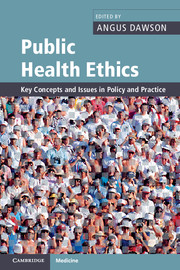Book contents
- Frontmatter
- Contents
- List of contributors
- Preface
- Acknowledgements
- Section 1 Concepts
- Section 2 Issues
- 5 Smoking, health and ethics
- 6 Infectious disease control
- 7 Population screening
- 8 Vaccination ethics
- 9 Environment, ethics and public health
- 10 Public health research ethics
- 11 Equity and population health
- 12 Health inequities
- Index
- References
12 - Health inequities
Published online by Cambridge University Press: 05 July 2011
- Frontmatter
- Contents
- List of contributors
- Preface
- Acknowledgements
- Section 1 Concepts
- Section 2 Issues
- 5 Smoking, health and ethics
- 6 Infectious disease control
- 7 Population screening
- 8 Vaccination ethics
- 9 Environment, ethics and public health
- 10 Public health research ethics
- 11 Equity and population health
- 12 Health inequities
- Index
- References
Summary
Introduction
The infant mortality rate (IMR) in Liberia is 50 times higher than it is in Sweden, while a child born in Japan has a life expectancy at birth of more than double that of one born in Zambia (Central Intelligence Agency, 2007). And within countries, we see differences that are nearly as great. For example, if you were in the USA and travelled the short journey from the poorer parts of Washington to Montgomery County Maryland, you would find that ‘for each mile travelled life expectancy rises about a year and a half. There is a twenty-year gap between poor blacks at one end of the journey and rich whites at the other’ (Marmot, 2004: 2).
There are two types of questions that it is important to ask about inequalities in health such as these. The first are social scientific questions about the extent of inequalities in health and the factors which are causally responsible for these inequalities. Examples of social scientific questions to ask might be: how do infant mortality rates in the UK differ according to social class? What is the difference in life expectancy between Japanese who emigrate to the USA and those who remain in Japan? Why do civil servants in higher ranked jobs tend to live longer than civil servants in lower ranked jobs?
- Type
- Chapter
- Information
- Public Health EthicsKey Concepts and Issues in Policy and Practice, pp. 211 - 230Publisher: Cambridge University PressPrint publication year: 2011
References
- 12
- Cited by



